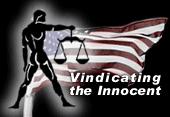By US~Observer Staff
Jury nullification,
in which jurors refuse to convict defendants under laws they find objectionable
or inappropriately applied, is a favored tactic of many libertarians
who, rightly or wrongly perceive individual liberty as, at best, a minority
taste among their neighbors. They like the idea of a tool that can be
wielded on the spot to shield people from powerful control freaks without
first having to win a popularity contest. But nullification is useful
only if people know about it. And last week, New Hampshire's governor
signed a law requiring the state's judges to permit defense attorneys
to inform
jurors of their right to nullify the law. --J.D.
Tuccille, Reason.com

New Hampshire Governor
John Lynch
|
New Hampshire Governor John Lynch signed HB
146 on June 18, 2012 - which
reads:
"A right
of accused. In all criminal proceedings the court shall permit the
defense
to inform the
jury of its right to judge the facts and
the application of the law in relation to the facts in controversy."
Short, simple and to
the point. Nullification advocate Tim Lynch of the Cato Institute thinks
it may not be a game changer, but it's a step in the
right direction. Lynch
says:
"This is definitely a step forward for advocates of jury trial. Allowing
counsel to speak directly to the jury about this subject is something that
is not allowed in all the courthouses outside of New Hampshire–so,
again, this is good. I am concerned, however, that this language does not
go far enough. We don’t know how much pressure trial judges will exert
on defense counsel. As noted above, if the attorney’s argument is 'too
strenuous,' the judge may reprimand the attorney in some way or deliver his
own strenuous instruction about how the jurors must ultimately accept the
law as described by the court, not the defense. I’m also afraid what
the jurors hear will too often depend on the particular judge and, then,
what that judge wants to do in a particular case."
As an advocate for victims who are falsely charged with crimes they did
not commit, the US~Observer has witnessed many cases where not only the law
should be questioned, but more importantly, the govenment agencies involved
in charging the accused. The idea the the government says there has been
a crime committed and we are going to prosecute should be highly questioned
by every jury regardless of the state in which proscutes.
 Back in 1999, the Washington Post wrote:
Back in 1999, the Washington Post wrote:
"In courthouses across
the country, an unprecedented level of juror activism is taking hold, ignited
by a movement of people who are turning their back
on the evidence they hear at trial and instead using the jury box as a bold
form of civil protest...
The most concrete sign of the trend is the sharp jump in the percentage
of trials that end in hung juries. For decades, a 5 percent hung jury rate
was considered the norm, derived from a landmark study of the American
jury by Harry Kalven Jr. and Hans Zeisel published 30 years ago. In recent
years, however, that figure has doubled and quadrupled, depending on location.
That article featured
a pre-gunrunning Eric Holder objecting that, "There
is a real potential danger if this problem goes unchecked."
Former California Prosecutor
Nathan Wente, now Defense Lawyer stated he has personally witnessed
a judge during jury selection ask potential
jurors if they believe in Jury Nullification, so they could
be excused from jury selection if they said yes.
Wente further stated:
"A politician who would be so bold to do this suggests there is enough
support from his
constituency,
and more intriguing is that there are enough people
who understand the importance of it. This is truly a breathe of fresh air."
Paula Hannaford-Agor,
of the National Center for State Courts, and Valerie P. Hans, of Cornell
Law School, penned a 2003 paper published in the
Chicago-Kent Law Review that said:
"The criminal
justice community has become increasingly concerned about the policy
implications of jury
nullification, especially as jury nullification
manifests itself in hung juries. A number of communities, especially in California,
report that up to one-quarter of all criminal jury trials routinely result
in mistrials due to jury deadlock."

Chief Justice John
Jay
|
Jury nullification can
be traced back to one of the first substantial Supreme Court cases in 1794
- Georgia
vs. Brailsford (3 Dall 1). The instructions to the jury
illustrated the true power of the jury. Chief Justice John Jay said: "It
is presumed, that juries are the best judges of facts; it is, on the other
hand, presumed that courts are the best judges of law. But still both objects
are within your power of decision." (emphasis added) "...you have
a right to take it upon yourselves to judge of both, and to determine the
law as well as the fact in controversy."
As recent as 1972, the
U.S. Court of Appeals for the District of Columbia said that the jury has
an "unreviewable and
irreversible power... to acquit in disregard of the instructions on the
law given by the trial judge
(US vs Dougherty)."
Jury nullification is something
very few know of today. It is also becoming more common to see hung jury
verdicts according to experts. In New Hampshire,
let's hope that jurors will start a trend of what juries should already be
doing, now that it's oficailly "Okay".
Editors Note: Over the
years, the US~Observer has sought to inform the public on Jury Nullification.
It is one of the primary components to keeping a free society. Without
Jury Nullification the courts would be allowed to railroad anyone. It's
no wonder they try to hide it from those who serve. You can read our past
articles here: JURY NULLIFICATION
 Loading Image...
Loading Image... Loading Image...
Loading Image...



 Share This Article
Share This Article